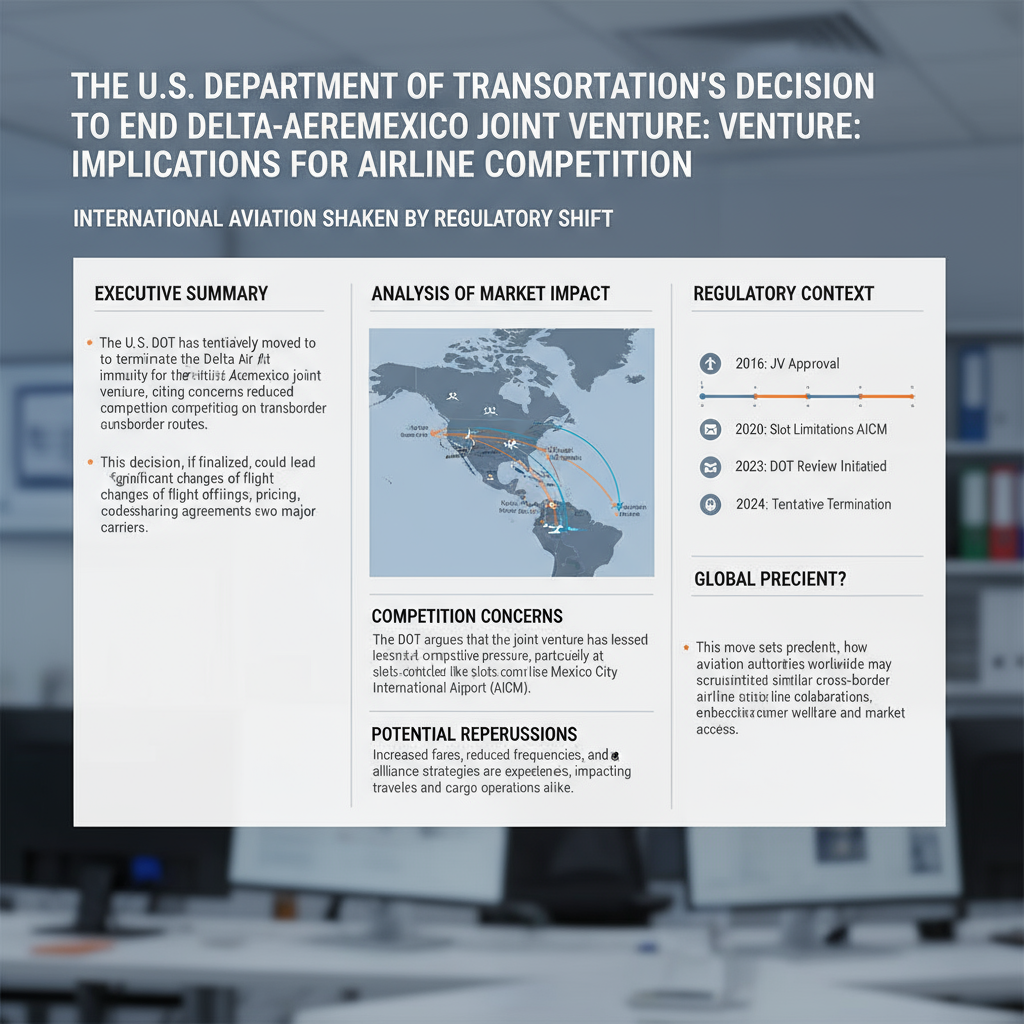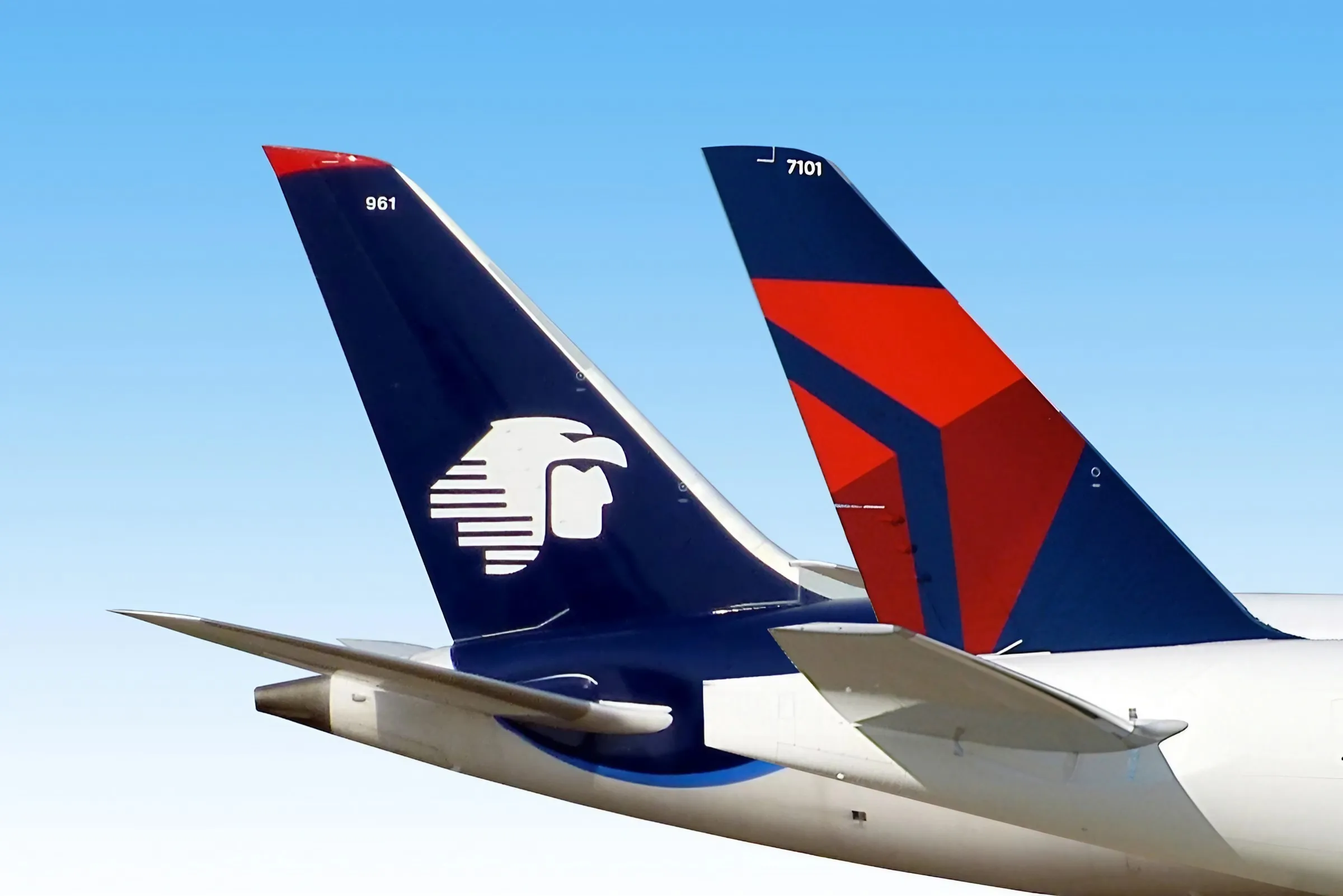
DOT Ends Delta-Aeromexico Joint Venture Impacting Airline Competition
The U.S. Department of Transportation (DOT) has ordered the termination of the antitrust-immunized joint venture between Delta Air Lines and Aeromexico, signaling a shift toward stricter enforcement of competition laws in aviation. This joint venture, initially supported under the U.S.-Mexico Open Skies agreement, allowed the two airlines to operate as a single entity on transborder routes, enhancing efficiency but raising concerns about reduced competition and higher fares. The DOT's decision aims to dismantle this near-monopoly, encouraging more competition that could benefit consumers through lower prices and improved services. Additionally, Mexico’s regulatory actions on airport slot management have influenced competition dynamics, affecting market access for airlines on both sides. Globally, regulators are increasingly scrutinizing airline alliances to prevent market concentration, with environmental considerations now playing a key role in aviation policy decisions. Although the end of the joint venture may cause short-term disruptions, it could foster a more competitive and sustainable air travel market between the U.S. and Mexico in the long run.
Summary
The U.S. Department of Transportation's Decision to End Delta-Aeromexico Joint Venture: Implications for Airline Competition
In a significant move impacting international airline operations, the U.S. Department of Transportation (DOT) has ordered the termination of the antitrust-immunized joint venture between Delta Air Lines and Aeromexico. This decision underscores a broader trend towards reevaluating antitrust exemptions in the aviation sector, aiming to foster competition and protect consumer interests. Here are the key takeaways:
- The DOT's decision reflects a shift towards stricter enforcement of competition laws in aviation.
- Antitrust immunity has historically supported international airline cooperation under Open Skies agreements.
- Mexico's regulatory actions on airport slots influence U.S.-Mexico airline competition.
- Global trends show increased scrutiny on market concentration in aviation.
- Environmental considerations are becoming integral to regulatory decisions in aviation.
The End of Delta-Aeromexico Joint Venture
The joint venture between Delta and Aeromexico, which allowed for extensive codesharing, frequent flyer partnerships, and coordinated scheduling, was initially granted antitrust immunity under the framework of the U.S.-Mexico Open Skies agreement. This immunity permitted the airlines to operate as a single entity on transborder routes, enhancing efficiency and passenger convenience. However, the DOT's recent order to disband this venture highlights concerns over reduced competition, potentially leading to higher fares and fewer choices for consumers traveling between the U.S. and Mexico.
Competition Concerns
The decision to end the joint venture was driven by concerns that the partnership was stifling competition. With both airlines dominating many routes between the two countries, smaller carriers and new entrants found it challenging to compete. The DOT's action aims to dismantle what could be seen as a near-monopoly, encouraging a more dynamic market environment where competition thrives, potentially benefiting consumers through lower prices and better service options.
Impact on Consumers and Airlines
For consumers, this change might initially bring uncertainty regarding route availability and pricing. However, in the long term, increased competition could lead to more competitive pricing and service innovations. For Delta and Aeromexico, the end of the joint venture means a strategic overhaul. They must now navigate the competitive landscape independently, potentially affecting their market access and operational strategies.
Legal and Policy Background of Antitrust Immunity
Historical Context
Antitrust immunity for international airline joint ventures has been a cornerstone of Open Skies agreements, which aim to liberalize air travel by removing government restrictions. These agreements have facilitated smoother operations and better service integration between international partners. However, the balance between fostering cooperation and maintaining competition has always been delicate. Recent shifts in policy reflect a growing concern that such immunities might be overly protective, leading to market distortions.
Reevaluation of Antitrust Immunity
The reevaluation of antitrust immunity in the context of Open Skies agreements is part of a broader global trend. As seen in the European Union, where similar alliances are under scrutiny, regulators are increasingly wary of how these partnerships might consolidate market power. This scrutiny is driven by a desire to ensure that the benefits of deregulation and liberalization do not come at the cost of consumer welfare or market fairness.
Mexico's Role in Market Competition
Slot Management and Regulatory Actions
Mexico's approach to airport slot management has played a crucial role in shaping competition dynamics. By confiscating slots from airlines, the Mexican government can redistribute these valuable assets to encourage new market entrants or penalize underutilization. This regulatory tool directly impacts U.S. airlines operating in Mexico, affecting their ability to maintain or expand their market presence.
Influence on U.S.-Mexico Airline Relations
The regulatory landscape in Mexico, including slot confiscations, has implications beyond just operational logistics. It influences the competitive balance between U.S. and Mexican airlines, potentially altering the market access dynamics established through bilateral agreements like the Open Skies treaty. This has led to strategic responses from U.S. carriers, who must adapt to these changes while advocating for fair competition.
Global Trends and Environmental Considerations
Global Scrutiny on Market Concentration
The decision by the DOT is reflective of a global trend where regulatory bodies are more critically assessing market concentration in aviation. This trend is driven by concerns over consumer rights, market fairness, and the economic implications of airline deregulation. The European Union's similar stance on airline alliances further illustrates this global shift towards ensuring that deregulation benefits all stakeholders, not just the dominant players.
Environmental Impact
Incorporating environmental considerations into aviation regulation is becoming increasingly important. The cessation of joint ventures like Delta-Aeromexico can have environmental implications, as airlines might need to adjust their routes and operations, potentially affecting carbon emissions. Regulatory decisions now often consider sustainability, influencing how market access and joint ventures are managed to align with green aviation goals.
Economic Implications
The economic ramifications of ending such a significant joint venture are profound. Local economies, particularly those reliant on tourism and business travel between the U.S. and Mexico, might see shifts in employment, route availability, and economic activity. While the immediate impact might be negative due to potential job losses and service disruptions, the long-term effect could be positive if increased competition leads to more robust economic activity through innovation and consumer choice.
Conclusion
The DOT's decision to end the Delta-Aeromexico joint venture marks a pivotal moment in U.S.-Mexico aviation relations, reflecting broader trends in competition law enforcement and regulatory oversight. As airlines adapt to this new competitive landscape, the implications for consumers, the environment, and the economy will unfold over time, potentially reshaping the future of international air travel between these two nations.

Frequently Asked Questions
Q: Delta Aeromexico lawsuit details
A: The lawsuit involving Delta Air Lines and Aeromexico pertains to allegations of unfair competitive practices and breaches of agreed partnership terms within their codeshare and joint venture agreement. The dispute reportedly centers on issues such as route allocations, pricing strategies, and revenue-sharing conflicts. Both airlines have sought legal resolutions to address these challenges in order to maintain their cooperative business relationship. Specific details about the lawsuit's progress and outcomes are subject to ongoing legal proceedings and corporate disclosures.
Q: DOT antitrust immunity rules for airlines
A: The U.S. Department of Transportation (DOT) grants antitrust immunity to airlines to allow them to collaborate on certain aspects like code-sharing, scheduling, and pricing without violating antitrust laws. This immunity is designed to promote efficiency and expand consumer options while maintaining competition. However, it is granted selectively to partnerships that show substantial public benefits and does not protect all airline agreements. The DOT regularly reviews these arrangements to ensure they do not harm competition or consumers.
Q: impact of Open Skies agreements on airline partnerships
A: Open Skies agreements are bilateral or multilateral treaties that liberalize the rules for international aviation markets by removing government-imposed restrictions on routes, capacity, and pricing. These agreements encourage airline partnerships by enabling carriers from signatory countries to operate freely, fostering greater code-sharing, joint ventures, and resource sharing. As a result, airlines can offer passengers more destination options, competitive fares, and improved connectivity, while enhancing operational efficiencies through cooperative agreements. Overall, Open Skies policies help create a more integrated and competitive airline industry.
Q: why is Delta challenging DOT ruling
A: Delta Air Lines is challenging a Department of Transportation (DOT) ruling because they disagree with the regulatory interpretation or enforcement that impacts their business operations. Often, such challenges arise when the airline believes the ruling imposes unfair requirements, harms their competitive position, or raises operational costs. By contesting the ruling, Delta aims to protect its interests, ensure regulatory clarity, and maintain its market strategy. The specific dispute typically involves matters like slot allocations, fare regulations, or consumer protection measures.
Q: effects of Mexico City airport slot restrictions
A: The slot restrictions at Mexico City airport limit the number of takeoffs and landings, leading to reduced flight frequency and capacity. These constraints can cause higher ticket prices due to limited supply and increased competition for available slots. Airlines may also face challenges in scheduling, potentially reducing connectivity and limiting growth opportunities. Additionally, nearby airports might experience increased traffic as carriers seek alternatives to bypass the restrictions.
Key Entities
Delta Air Lines: Delta Air Lines is a major American airline headquartered in Atlanta, Georgia, operating extensive domestic and international flights. The airline collaborates with Aeromexico, enhancing connectivity between the United States and Mexico City.
Aeromexico: Aeromexico is Mexico's flagship carrier, based in Mexico City and operating flights worldwide. It partners with Delta Air Lines to strengthen air travel links between Mexico and the United States.
Department of Transportation: The U.S. Department of Transportation oversees federal transportation policies and regulations, including airline operations. It plays a role in approving international airline partnerships such as those between Delta Air Lines and Aeromexico.
Mexico City Benito Juárez Airport: Mexico City Benito Juárez Airport is the busiest airport in Mexico, serving as a primary hub for Aeromexico. It facilitates significant international traffic, particularly flights connecting to the United States.
11th Circuit Court of Appeals: The 11th Circuit Court of Appeals is a federal appellate court covering Alabama, Florida, and Georgia. It handles legal disputes that can affect transportation and airline operations within its jurisdiction.
External articles
- Trump's Transportation Secretary Sean P. Duffy Enforces ...
- Why Delta's Aeromexico Lawsuit Is More Strategy Than ...
- Delta, Aeromexico challenge US decision to dissolve joint ...
Related Articles
- Luxury Hotel Openings to Watch in 2025: Exclusive Resorts and Historic Charm
- Kristen Bell Stars in Citi Strata Elite Card Ad Campaign Highlighting Exceptional Travel Rewards
- Integrating Nature, Technology, and Wellness in Modern Office Design
YouTube Video
Title: US tells Delta, Aeromexico to end joint venture | REUTERS
Channel: Reuters
URL: https://www.youtube.com/watch?v=BAHkfn-nXKU
Published: 4 weeks ago
Travel